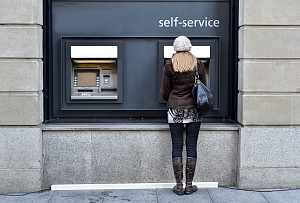Selecting a banking institution is a process of deliberation for some customers. Today, most banking customers evaluate an institution by its rates, products, and services online in advance of the decision to join. Before opening a new checking, savings, or investment account, review this comparison of big banks vs. local banks by priority to find the right bank.
Banking Basics 101
While the priorities of the bank-client relationship may vary, there are some basic criteria most new customers look for when searching for a new bank. Review the pros and cons associated with big bank vs. local bank for consumer value:
Access
 The convenience factor is a major priority for most banking customers. The number of ATMs and onsite access points in a bank’s network are usually positive aspects when a prospective client is searching for a compatible banking relationship.
The convenience factor is a major priority for most banking customers. The number of ATMs and onsite access points in a bank’s network are usually positive aspects when a prospective client is searching for a compatible banking relationship.
Pros
Nationwide access, once the exclusive option found only with major financial institutions, is now a component of community banks. While the big banks still outnumber with onsite locations, local banks are catching up by way of online presence and multiple ATM networks across many geographical locations.
Cons
Multiple location is an essential priority for most banking customers, yet virtual access can sometimes be subject to technical difficulties. The occurrence of ATM and online banking issues outside the direct control of the bank, are not uncommon for both big bank and local bank competitors. Local bank technical support specialists are often more expedient in direct customer service response, reducing the wait time until an issue is resolved.
Fees and Rates
Interest rates for loans are established by the U.S. Federal Reserve monetary policy; however, there is still variance available by institution. Fees for checking account overdraft and non-sufficient funds transactions also vary across the banking marketplace. Some institutions charge monthly service fees, as well as initiation fees for opening an account. Be sure to speak with a bank representative about these fees before signing up for a new account.
Pros
Interest rates and fees correspond with account services and special transactions and should be compared when comparing banks. Although banks tend to scale interest rates and fees according to product and service offering, local banks will often create better than market opportunities to promote investment and lending. Often they accomplish this with interest rate yield adjustment and fee waivers to attract customers away from big bank counterparts that lack flexibility in their corporate structuring of fees.
Cons
Adjustable interest rate APR based on corporate policy changes or product and service modifications can lead to lower earnings and additional costs. Big banks often charge monthly service fees for account maintenance, whereas local community banks are more likely to offer customers fee-free account service.
Services
 Financial services offered by a banking institution may involve investment vehicles or special transaction types. Interested clients can ask about the details of a particular service to discover how a banking institution can fulfill their needs.
Financial services offered by a banking institution may involve investment vehicles or special transaction types. Interested clients can ask about the details of a particular service to discover how a banking institution can fulfill their needs.
Pros
In recent years the range of service offerings offered by banking institutions has expanded to include special account services, as well as traditional investment, retirement, and wealth planning. Distinct from the global offerings of big banks, local banks may provide clients with specialized services tailored to their specific requirements such as loans for professionals working in specific industries.
Cons
One downside of relying on a large bank for financial planning, investing, or special transactions is the potential lack of personalized attention and tailored advice. Due to their size and customer volume, large banks may prioritize standardized solutions and may not allocate sufficient time or resources to understand individual financial goals and unique circumstances. This can result in generic recommendations that may not align with specific needs or provide the desired level of expertise. Additionally, large banks may have higher fees and limited product options compared to local banks.
Social Responsibility
Banking institutions are supporters of socially responsible business lending and community sponsorship. Explore a bank’s commitment to community and reap the rewards of matching contribution account incentives and other member programs offered by an institution.
Pros
Community banks are an excellent choice for those seeking personalized assistance by phone and in-house. Community banks are local knowledge resources with a focus on community business lending. Check your community for local business lending opportunities not offered by large investment institutions.
Cons
Big banks not only spend little time on community relations, they tend to outsource customer service roles to workers in offshore call services companies who have access to accounts and other normally undisclosed personal information.
A Local Community Bank
There are certain benefits to banking with a local community bank. Build your financial future without the extra fees, hassle, and risks associated with large banking institutions. Contact a local Woodsboro Bank specialist about our account services and other premium financial products. We are proudly supporting our local communities!